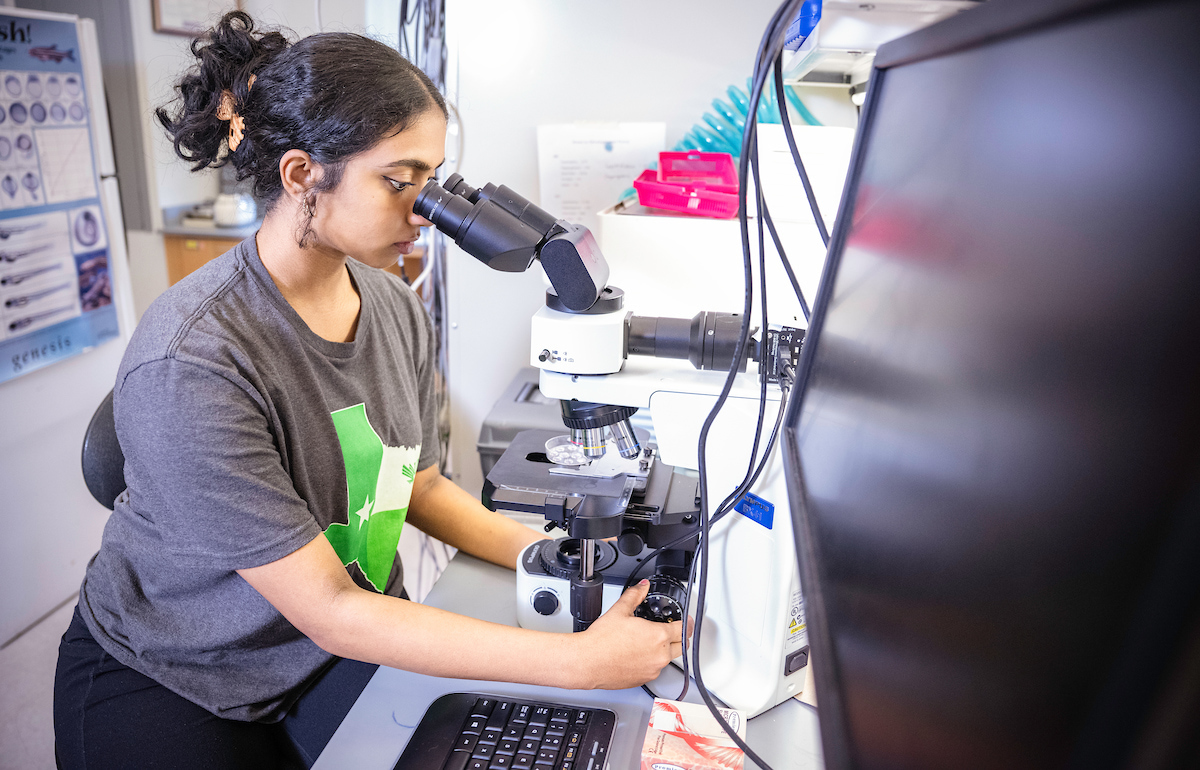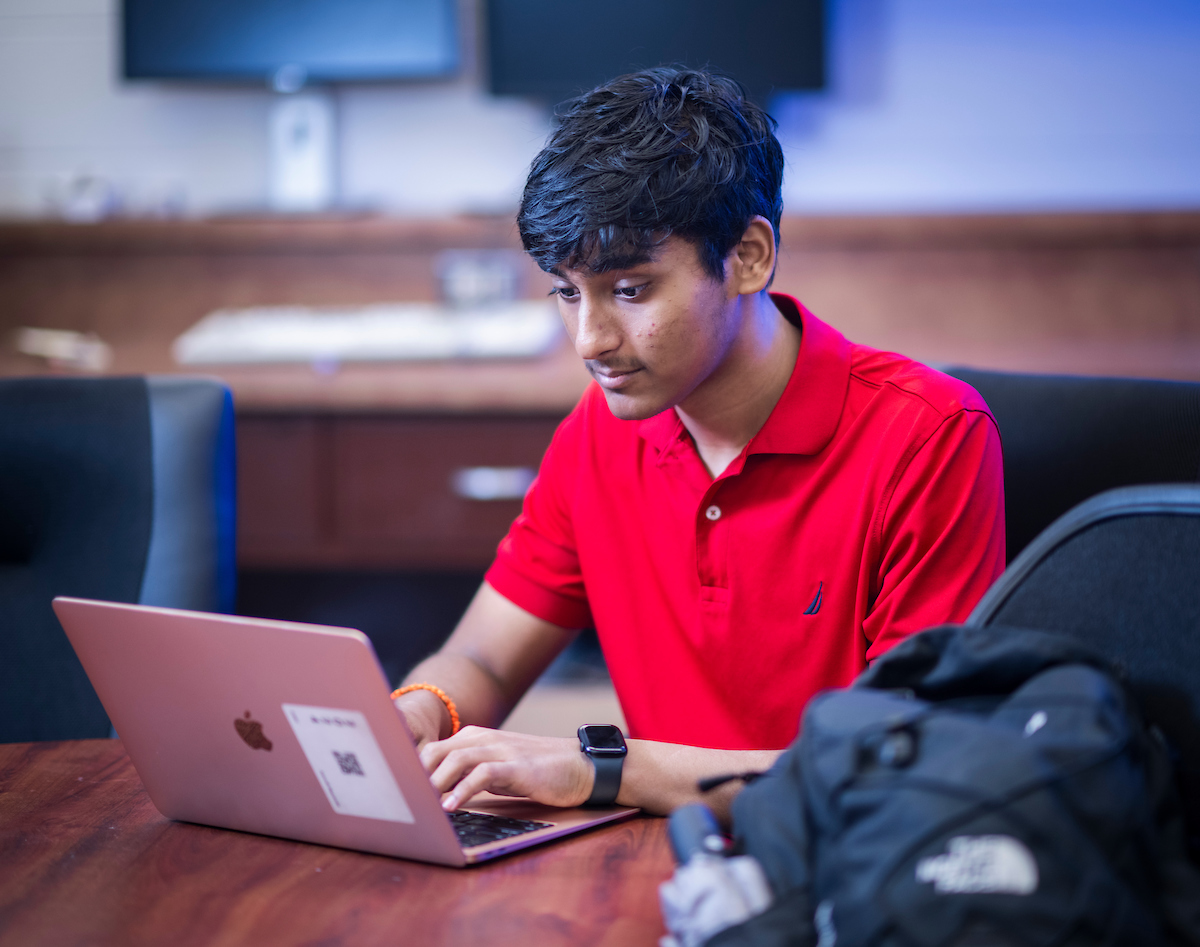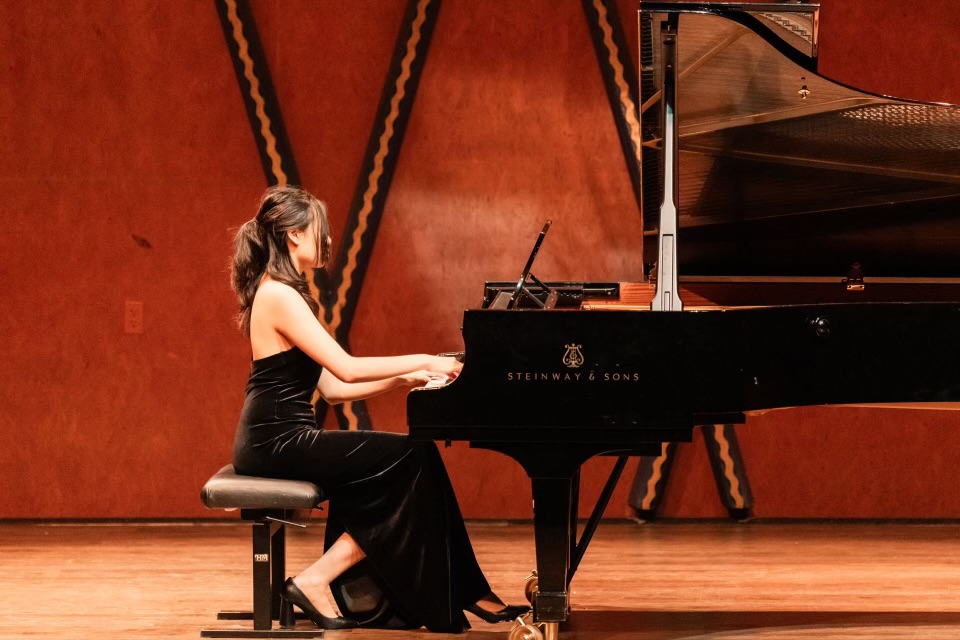
DENTON (UNT), Texas – Thanks to a program at the University of North Texas, students who would typically still be in high school are able to attend college classes and gets hands-on experience in a research lab or a performance hall all while earning college course credit.
The Texas Academy of Mathematics and Science (TAMS) at UNT is the nation’s first early college entrance residential program for high-school-aged students. The program admits students who are Texas residents enrolled in ninth, 10th or 11th grade at a Texas high school. Accepted students withdraw from their high schools and start their journey as TAMS students while living on UNT’s campus.
Developing research skills
Shriya Raja joined TAMS last year in what would have been her junior year at Coppell High School. She’s now in the general math and science track in TAMS.
“It was definitely a shift from high school,” Shriya said. “I have to put in a lot of work myself instead of having teachers spoon feed me the answers. I’ve learned a lot of new study techniques.”
Shriya initially wanted to become a doctor, but her experience in College of Science professor Warren Burggren’s lab has her now considering a switch to research.
“I’ve found it extremely enjoyable from what I’ve done here, and I think it would make a great career,” she said.
Shriya primarily works with zebrafish and currently studies how exposure to hydrocarbons derived from fossil fuels affects their brains.
“The fascinating thing about zebrafish is that they’re genetically very similar to humans so we can see how these hydrocarbons affect their brain tissue and infer how they might affect us,” she said.

TAMS students can join a campus lab to assist with research once they’ve settled into the program. Some, such as Anirudh Mazumder from Grapevine High School, get a head start with the early summer research program. Participants move onto UNT’s campus and are placed in a research lab for nine weeks before classes begin.
“I don’t even know if I could pick a real word to describe it because working with professionals in a field you strive to be in someday is one of the coolest things you can do,” Anirudh said.
Anirudh works in the lab of biological sciences professor Rajeev Azad which focuses on bioinformatics and computational biology. Anirudh recently helped with a project developing an algorithm that can detect novel COVID-19 biomarkers.
While they gain experience in the university research labs, both Shriya and Anirudh have worked on their own independent research.
Shriya investigated whether genetic, epigenetic, or microRNA factors are most effective in diagnosing fibromyalgia using linear machine learning models. She also experimented with the carcinogenetic effect and epigenetic mechanisms of arsenic in groundwater.
Anirudh, who is studying computer science, focuses on developing artificial intelligence and machine learning-based algorithms for biomedical research. One project he worked on with another TAMS student is creating AI and machine learning applications to help patients with kidney diseases.
“While many family members have struggled with biological diseases like kidney disease and cardiovascular disease, I’ve found that biology isn’t my primary interest,” Anirudh said. “This research allows me to use data science to help people with diseases.”
The two also have been credited on research papers published by the professors they’ve worked for, something not many teenagers can boast.
“It attests to how these professors are willing to work with us,” Anirudh said. “The opportunity to not only work on their project but to be a part of the authorship is amazing to me.”
Exploring artistic passions
While the TAMS program name highlights math and science, students also can explore tracks in music, visual arts and health professions.
Aria Cai, a Plano resident who transferred from The Einstein School, is on the TAMS music track. Along with the TAMS requirements, music students must apply to UNT’s College of Music.

“People think music is easy, but you need commitment,” she said. “Getting into the College of Music to begin with is really difficult, especially since UNT is known for its music program.”
Once they’re in, TAMS music students continue with core classes, but by their second year, their schedule is primarily music-focused. Each semester, they prepare a 20 minute program to perform for critique and grade. Aria, who plays piano and sings said learning a piece is like “being in a research lab.” She delves into the history, composer’s influences and related works to truly understand the music.
The UNT community has been a key part of her growth.
“There are so many people to talk to about music. Every conversation expands your knowledge.”
Aria also apprecriates the facilities at UNT, like practice rooms and recording studios, and the opportunities to showcase her skills as an accompanist. She also sings with the UNT Camerata choral ensemble and performs with VIBE, a TAMS dance group.
“TAMS lets you explore new sides of yourself,” Aria said. “I never thought I was a dancer, but I fell in love with it.”
TAMS encourages students to get involved in events like Aid The Cause, a talent show that raises money for HIV/AIDS, and WorldFest, where students share their cultures and raise funds for refugee shelters.
“At TAMS, everyone can explore their passions,” Aria said. “You meet so many different people and learn from their experiences, helping you grow.”
Preparing for the next chapter
Aria, Anirudh and Shriya — all in their final year at TAMS — are deciding where they want to go to continue their education. Counselors within TAMS help students find the universities that best align with their goals and interests. While they work on their final decision, all three know TAMS prepared for them for the next step.
“Now I get to help other high school juniors find their place in the TAMS community, so they can make the impact that they want and pursue the opportunities they’re looking for,” Anirudh said. “I’m excited to show them that research can be fun.”
Some are already nostalgic for the program.
“It’s a great environment that prepares you for freshman year and shows that you can make it on your own,” he said. “And it’s okay to make mistakes here because there’s others who will help you. I think once we leave, we’re going to want it back.”